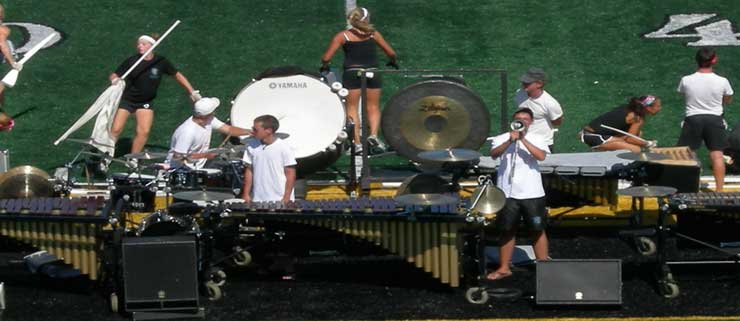.jpg) Have you ever faced your time to shine, and felt overcome with an intense hesitation or worry about an upcoming performance? As the time nears for you to address your audience, do you suffer from sweaty palms? Is there a lump in your throat? Do you experience tremors, tension, stuttering, upset stomach or loss of focus? All of these symptoms are a sign that you may suffer from performance anxiety, which is a common problem that requires a little mental rewiring to get you on the right track.
Have you ever faced your time to shine, and felt overcome with an intense hesitation or worry about an upcoming performance? As the time nears for you to address your audience, do you suffer from sweaty palms? Is there a lump in your throat? Do you experience tremors, tension, stuttering, upset stomach or loss of focus? All of these symptoms are a sign that you may suffer from performance anxiety, which is a common problem that requires a little mental rewiring to get you on the right track.
Â
Â
Music performance anxiety develops from the thoughts, feelings and habits of a musician. The level of anxiety that one has will affect a musician’s desire to perform, as well as their ability. In order to deliver a high-quality performance, a musician must overcome the mental obstacles that create a barrier between wanting to perform and actually completing the act. When you feel anxious, pressure begins to build up that makes it impossible to pick up an instrument or sing a song.
Main Types of Performance Anxiety
There are three main kinds of performance anxiety that musicians encounter. The first occurs before a performance date is even mentioned. Fear of rejection or self-doubt regarding their abilities may hinder a musicians attempt to arrange a showing of their talents. The anxiety sometimes mounts to the point where a musician never feels they are truly ready to perform in front of others.
The second type of anxiety occurs during an actual performance. Gripped by fear of what the audience thinks of them, a musician’s body might tremble. Sweat may form on their forehead, nose, neck or hands. These bodily reactions may also impact the way an instrument is played. Voices become tight or locked, emitting cracked, flat or quivering notes. The anxiety of a musician might be so high that they may actually self-sabotage their performance without even knowing it.
Anxious musicians often become quite distracted by the slightest movement or noise during a performance. They might take this opportunity to blame their inability to complete their set because of outside interruptions. This is just an excuse. Within themselves, they do not feel completely adequate to continue their performance. Musicians with performance anxiety often exhibit poor concentration, as well as loss of focus.
After a performance, the anxiety madness continues, which is seen through a harsh, unforgiving critique of their presentation. The musician will nit-pick every aspect of their set and despite positive encouragement and comments, they will continue to downplay and dismantle their ability.
Tips On Managing Performance Anxiety
When it comes to getting over the hump of performance anxiety, there are numerous ways to combat the fears and doubt that come with presentation. Below are five aspects of performing that a musician suffering from anxiety should take into consideration:
1) Self-Assessment
When you get to know the ins and outs of yourself as an individual, as well as a musician, you are inching your way towards overcoming performance anxiety. Knowing what makes you tick both inside and outside musical circles will help you to better deal with the problems you face before, during and after a performance. A musician should analyze their performance goals, personal capabilities and limitations.
Musicians should also know that everyone has to start somewhere with infinite room for improvement. It is quite important for a musician to perform to the best of their abilities, as well as learn from mistakes and peer criticism.
2) Exposure: Baby Steps
Musicians should take the opportunity to gradually expose themselves to varying levels of performing. One moment a full-length mirror becomes a suitable audience, while the next could be a crowd of five friends. Testing low, medium and high levels of stressful performance situations will help musicians slowly overcome the issues faced in regards to performing. Additional suggestions include practice performances in an empty theater, dress rehearsals with friends and taping acts, then viewing them with family and friends.
3) Preparation
In anything that we do, preparation is an important component for achieving success. A good performance is one that has been thought out, thoroughly visualized and played over and over again in the mind. Once the mental preparation is complete, the physical part of the process involves sufficient practice and specific rehearsing for the particular venue you may perform at. Before a performance, a musician should enter this moment with a clear head. Meditation, yoga and other muscle relaxation techniques can create the right state of mind.
4) During a Performance
Every musician at some point in their lives will feel the flutter of butterflies before, during or after a performance. This is a normal occurrence that just takes some longer to get over. When it comes to the audience, you shouldn’t focus on blocking them out, but instead embrace them as support. If you go into a performance thinking that no one likes you or during a presentation focus on scowling faces, you will surely surrender to your flight or fight performance anxiety tactics.
Try to put anxiety in the backseat and attempt to stay calm. If you make a mistake, such as tickle the wrong piano keys, simply move on and do not dwell on small imperfections that pale in comparison to the overall scheme of things. Sometimes, if you don’t wear your disappointment or errors on your face, the audience is less apt to remember or care about mistakes. Breathing techniques will also come in handy once you get into the thick of performing and feel a touch of anxiety.
5) After the Performance
After each performance, take the time to assess yourself before relying on the approval or criticism of others. No one but you truly knows all of the hard work and preparation that went into your performance. Take the time to give yourself a mental pat on the back. Next, combine outside comments with your gut feeling to decide on what you can do next time. Regardless if you had the performance of your life or tanked on your first break, there are always aspects of your musical craft that you can still shape and mold for the future.
Kevin is the publisher and editor of musicianhome.com, a site that provides information and articles for musicians at all stages of their development.
Â







 Scroll down to view the comparison chart of over a dozen different portable digital audio recorders.
Scroll down to view the comparison chart of over a dozen different portable digital audio recorders.